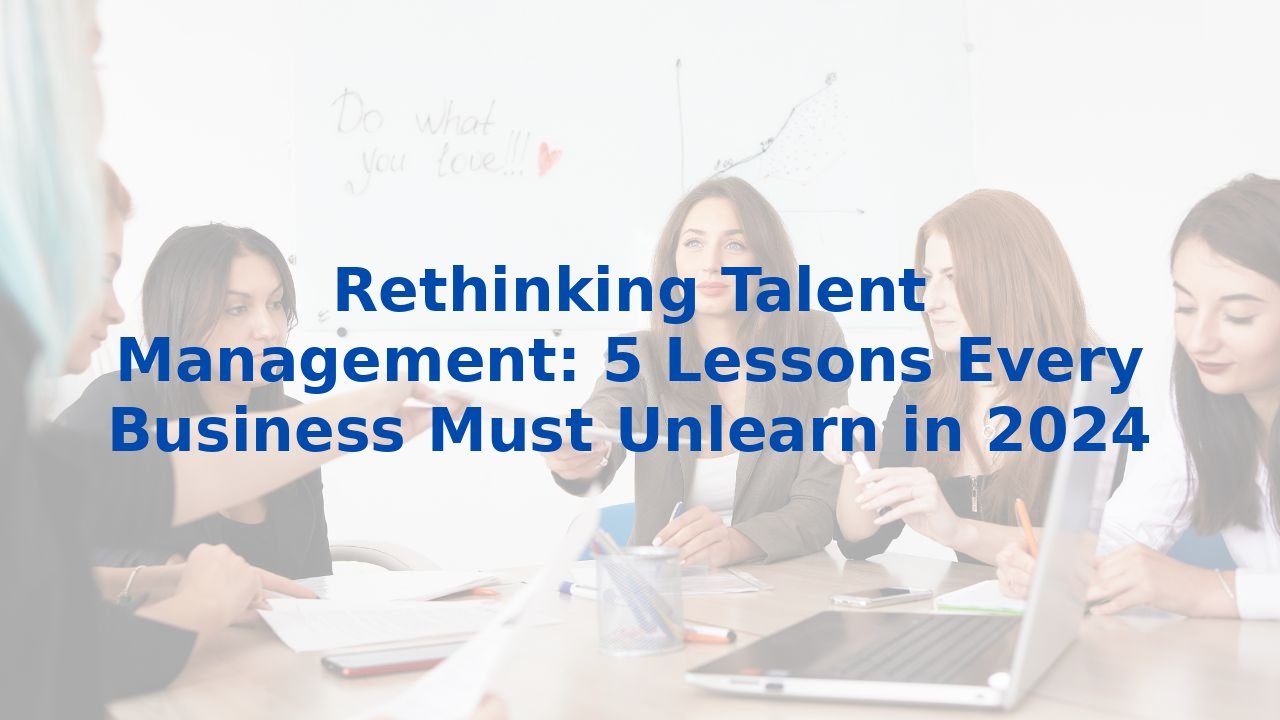Rethinking Talent Management: 5 Lessons Every Business Must Unlearn in 2024
Rethinking Talent Management: 5 Lessons Every Business Must Unlearn in 2024
As we step into 2024, the landscape of talent management is evolving at an unprecedented pace. With the integration of Artificial Intelligence (AI) into business practices, organizations must reassess and unlearn outdated methods that no longer serve their strategic goals. This blog highlights five critical lessons that businesses must let go of in 2024 to reap the benefits of AI and streamline their talent management processes.
Lesson 1: The Myth of One-Size-Fits-All
For years, organizations have operated under the assumption that a single talent management strategy could cater to all employees. This approach not only stifles individual growth but also fails to take advantage of the diverse strengths within a team. In 2024, businesses should embrace personalized development plans tailored to individual strengths and career aspirations. AI can play a crucial role here by analyzing performance data, skills gaps, and career trajectories, enabling organizations to craft bespoke talent management strategies.
Lesson 2: Reliance on Traditional Performance Reviews
The conventional performance review process is often seen as tedious and ineffective. Instead, organizations should adopt a more dynamic feedback culture that leverages real-time data. AI tools can continuously monitor employee performance and engagement levels, providing insights that can lead to timely interventions. By moving away from static annual reviews, companies can foster a more responsive culture that promotes continual growth and development.
Lesson 3: The Overemphasis on Technical Skills
While technical skills are undoubtedly vital, an exclusive focus on them can lead to a workforce that lacks adaptability and creativity. In 2024, businesses must unlearn this limitation and recognize the importance of soft skills. AI can assess personality traits, collaboration styles, and interpersonal skills, helping employers identify candidates who not only excel technically but can also thrive in a collaborative environment. This holistic approach will cultivate a resilient workforce ready to tackle the complexities of modern challenges.
Lesson 4: Neglecting Employee Well-being
Historically, talent management has often prioritized productivity over employee well-being. However, a focus on mental health and work-life balance is essential for retaining top talent in today's competitive landscape. AI-driven analytics can provide insights into employee sentiment, workload patterns, and stress levels. By integrating well-being assessments into talent management processes, organizations can foster a healthier workplace culture that emphasizes holistic growth.
Lesson 5: Resisting Change
In a rapidly changing business environment, adapting to new technologies and methodologies is not just advantageous; it's necessary. Many organizations cling to legacy systems and outdated practices due to fear of change. Embracing AI and the opportunities it brings means letting go of that fear and fostering a mindset of innovation. AI can streamline processes, optimize resource allocation, and enhance decision-making, paving the way for a future-ready workforce.
Maximizing AI Potential: The Need for Employee Training
Transitioning to a forward-thinking talent management strategy requires not just unlearning old lessons but also equipping employees with the skills to thrive in this AI-enhanced landscape. Comprehensive training programs are essential for maximizing the benefits of AI integration in talent management.
Understanding AI Tools
Employees must be familiar with the AI tools and technologies available to them. Training on AI-driven platforms will not only enhance their capabilities but also instill confidence in utilizing these resources effectively within their daily tasks.
Data Literacy as a Fundamental Skill
In today's data-driven environment, employees should be adept in basic data analysis. This skill set allows them to interpret insights provided by AI tools, fostering a culture of informed decision-making. Ongoing training programs can be instrumental in developing data literacy across the organization, empowering teams to leverage AI for strategic advantage.
Embracing a Culture of Continuous Learning
Acknowledging the pace at which AI and technology are evolving, organizations must cultivate a culture of continuous learning. By offering access to training resources, like those available through Complete AI Training, businesses can ensure employees remain abreast of the latest advancements, ultimately benefiting the organization as a whole.
Conclusion
As we move forward into 2024, rethinking talent management requires a conscious effort to unlearn outdated practices and embrace AI-driven solutions. By focusing on tailored strategies, continuous feedback, well-being, and a mindset open to change, organizations can not only enhance their talent management processes but also foster a culture of innovation and resilience. The true potential of AI lies not just in technology but in the empowered workforce that leverages it. Embrace the future, invest in your team's growth, and watch as your organization thrives in an ever-evolving landscape.



